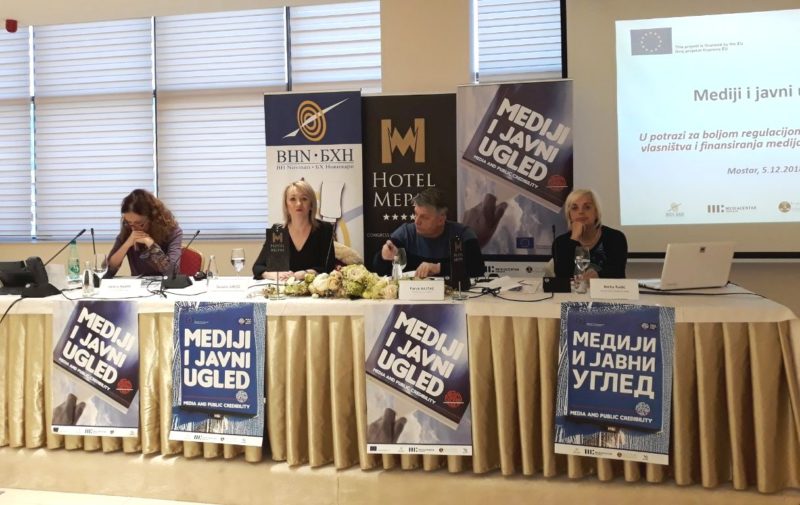
Mostar, 5.12.2018.- Representatives of the media community supported the adoption of the law on transparency of media ownership and the law on media advertising as two missing laws in the overall sector of media legislation in BiH and as a contribution to the journalistic profession and the stability of the media market in BiH.
As emphasized during the debate “Regulation of the advertising market and transparency of ownership in BiH” held in Mostar, these laws will protect the interest in media and separate, in a way, issues of money flow in media and the media industry from media content, professional standards and the quality of media content.
–In a way, these laws will protect journalists from clientelist policies that appear in the media ways that more and more media content and method of presenting topics are dictated by large advertisers, large public companies and the state, through media funding through its budget – emphasized Borka Rudić, General Secretary of BHJA.
Some studies, she added, show that state institutions (public authorities, ministries, etc.) appear as the biggest advertisers in the BiH market, which is huge amount of money.
This public money invested in the media must be clearly presented and have clear criteria, and the amount of public money that protects the public interest or certain interests of certain political, economic and national lobbying in BiH must be transparent, as she stressed.
Draft laws will be presented on December 17 in Sarajevo after the final conference “Media and public credibility” as a three-year EU project in BiH, and there shall be an opportunity to discuss professional proposals for at least one year inside the professional media community in order to improve them.
–As soon as the state authority is established in BiH, the draft laws will be submitted to parliamentary procedure – said Rudić.
Professor of the Faculty of Philosophy of Mostar University doc. Daniela Jurcic believes that it is necessary to create a model in which serious media would be clearly separated from other entities on the market and as such would be treated as bodies that act in the public interest.
– Given that the financing from public budgets in BiH is almost completely unregulated, the actual effect of financing on the quality of journalism and the public interest is extremely questionable – evaluates prof. Jurčić.
If we want to join the EU and we want it, she concludes, “then we have to stick to the EU Guidelines for Supporting Media Freedom and Media Integrity, but we will have to publish the scope and share of public funds in each media outlet.”
The president of the Mostar Fanuk Kajtaz news agency said that a set of laws that are actually in the function of the journalists and the media are in the function of the journalists themselves and that it should be supported because it will introduce a little more order into the media industry, which is never estimated to be in a worse situation..
–Journalists are underpaid, and partly theygave up from professional standards, not only for the media, but also for journalism as a profession – said Kajtaz, who believes that a clear legal framework would be of great importance to the media and journalists who have to work a lot more on their own professionalism.
On the debate it was also highlighted that there is a a need to establish a single database, which would be under the authority of the Regulatory Agency for Communications and / or the Press Council in BiH or some other organization.
The project “Media and Public Credibility” which was initiated with the aim of promoting the transparency of media ownership and legitimate forms of media financing and advertising in BiH, is financed by the European Union in Bosnia and Herzegovina and implemented by a consortium of BH Journalists Association , the Mediacentar Foundation, Press Council BiH and the NGO JaBiHEU.